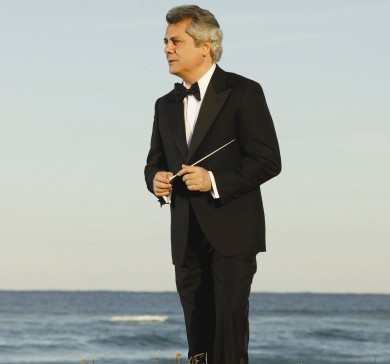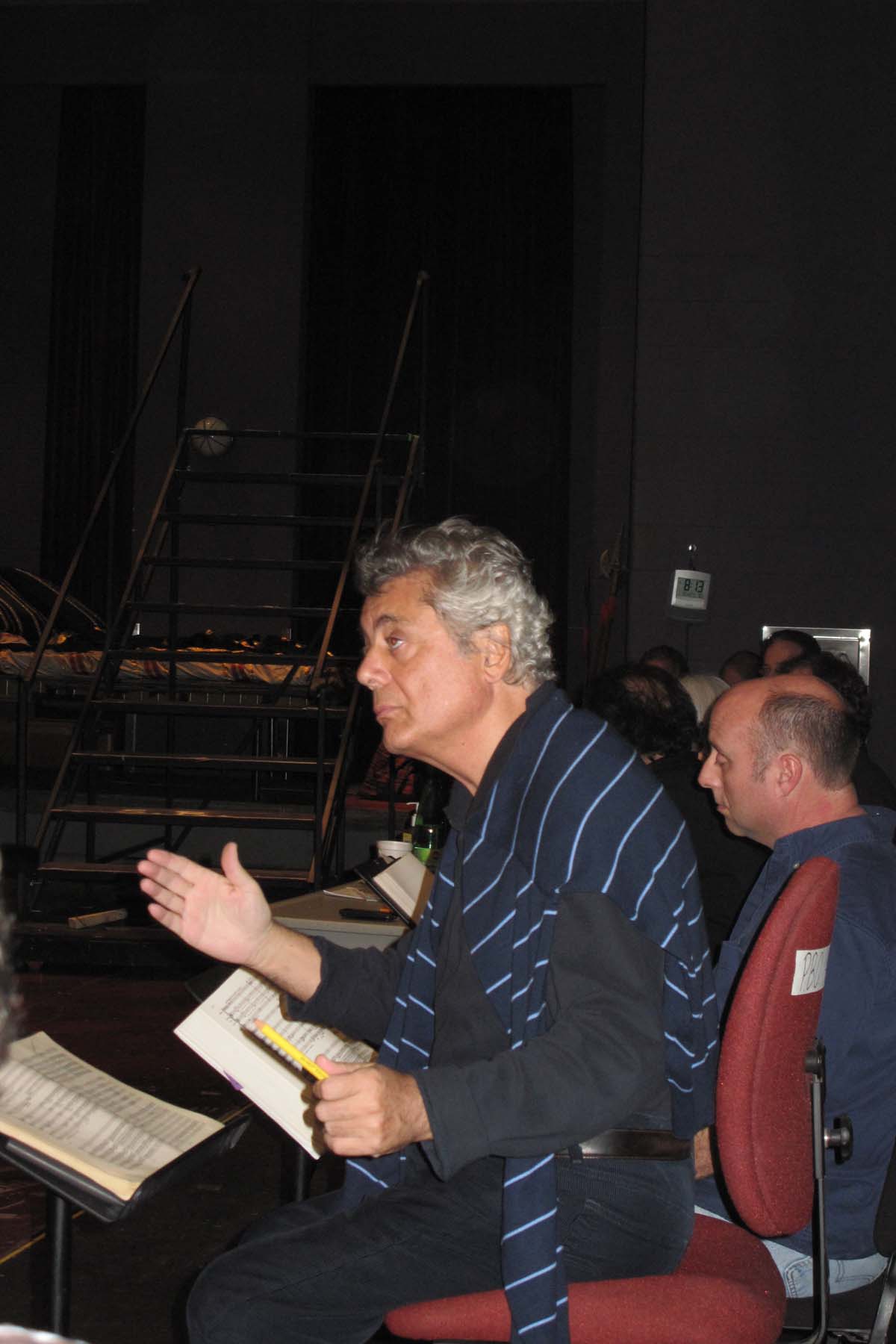In any language, Bruno Aprea is making an impact at Palm Beach Opera

The stormy opening of Verdi’s Otello clangs from an upright piano. About two dozen people in street clothes, looking as ordinary as citizens showing up for jury duty, mill around a rehearsal stage at the Kravis Center in West Palm Beach, as they portray the residents of Cyprus anxiously awaiting the return of Otello’s ship from battle.
Seated in a high chair in front, conducting with quick spare strokes, is Bruno Aprea, Palm Beach Opera’s artistic director and a major reason for its successes of the past four years.
As the members of the chorus fall to their knees and implore God to let the ship land safely in the storm, the silver-haired conductor rises from his chair, raises his arms and leads them with grand sweeping gestures. Even with a chorus in street clothes, even with the tinny sounds of a piano standing in for the orchestra, the scene has emotional power.
“He’s one of the last of the real Italian conductors,” said Daniel Sutin, one of two baritones who will handle the role of Iago in alternate performances of Otello this coming weekend at Palm Beach Opera. “He’s in touch with the score and he has the ability to express to the singers what he wants. He also knows how to breathe with the singers. Conductors sometimes don’t know how to do that.”
And unlike conductors who seem to acquire imperiousness and pomposity along with their first baton, Aprea is considered a very pleasant, unpretentious and decent man to work with. “He’s a very kind person,” Sutin said. “It’s just a wonderful experience being here.”
Aprea’s conducting has become the most dependable element of the Palm Beach Opera’s productions. A soprano or tenor may not always have a great night, but with Aprea in the pit, the orchestra plays with tight precision, a broad range of colors and textures, and phrasing of almost infinitesimal sensitivity.
Aprea was born in Naples and raised in Rome, where he studied the piano with his father at the Italian capitol’s Accademia Nazionale di Santa Cecilia. He began his musical career as a concert pianist, making tours of Italy, Holland and other countries. But he was drawn to the intellectual and musical complexities of conducting, and returned to school in Rome and Sienna to learn how to lead an orchestra. Today, in addition to conducting, he spends considerable time teaching, holding a faculty chair at Santa Cecilia and giving master classes.
When he first came to Palm Beach Opera in 2005, Aprea spoke a fractured English that sometimes left cast members groping for his meaning. Now, having led the opera company for four years—he still speaks a fractured English that sometimes leaves cast members groping for his meaning.

During a rehearsal of Act II, as Desdemona tries to convince an increasingly jealous and tormented Otello to pardon the young officer Cassio, Aprea stops the singers. “It’s too …” he tries an Italian word. Nobody gets it. He tries another. Nothing. “Too…too… coquette,” he says at last. This does it. The singers try it again, and now the scene moves with greater seriousness and menace.
Despite his language limitations, Aprea does make his intentions clear. At a youthul and remarkably energetic 68, he could easily pass for fifteen years younger, and singers working with Aprea in Otello value him immensely as a singer’s conductor and a vigorous, living link to opera’s heartland.
“For me it’s a dream because he has the Italian tradition, what’s considered the golden age of the 1960s,” said soprano Michele Capalbo, one of two singers in the role of Desdemona. “He allows me to sing Desdemona like Renata Tebaldi.”
Verdi wrote precise and detailed notes in the score to indicate how it was to be sung and played, and she said Aprea has the musical sensitivity and conducting technique to draw from the orchestra the vast range of dynamics and tonal colors necessary to do justice to Verdi. “Verdi gives it all to you, and if you have a partner in the pit who can support you in the orchestra with the full palette of colors and full range of dynamics, I’m in heaven.”
In an interview before the rehearsal, Aprea describes Otello as among Verdi’s “most exciting operas.” Excluding Falstaff, Verdi’s last opera and a work so unique that it stands alone in the composer’s output, he said Otello represents the peak, the culmination of everything Verdi had done before. “We can say that Verdi has reached the same level as Shakespeare,” he said. “The absolute intensity and knowledge of the human soul is in every word, in every action.”
“This is a tragedy because Otello is pushed from two oppositions to destruction,” he said. “One is the purity, the innocence, the beauty of Desdemona. The other is the – how do you say – the diavolo that is Iago.”
Aprea began his professional relationship with Otello at a production in Cape Town with the legendary tenor Jon Vickers. Only after the performance came off successfully did Aprea pull Vickers aside and say, “Now I can tell you. This was my first Otello.”
He also performed the opera in a soccer stadium in the Italian city of Bari, where a thunderstorm made the opening scene “dangerously realistic.”
One of Verdi’s achievements in Otello was to produce a through-composed opera that weaves music and plot tightly together, rather than proceeding formally from aria to duet to chorus, with the drama often lurching to a stop, no matter how beautiful the music. This tight construction, along with the major role assigned to the orchestra, presents a formidable challenge to the conductor, but one that Aprea welcomes.
“The drama is in the pit as much as on the stage,” he said. “It is the best for the conductor. For the conductor, it is his most symphonic work. I don’t want to say he became a Wagnerian, but everything is in the orchestra. You don’t have to just accompany.”
Aprea’s method of preparation is unusual. Of course, he studies the score and listens to recordings. But it’s the choice of recordings that is odd. “I prefer to listen to the worst record, the worst I can find, for then I can understand what I don’t want to do,” he said. (He declined repeated invitations to identify horrible recordings of Otello.) “The best –– it’s useless. The best is not to be imitated. The sublime it is not possible to imitate. But the worst, it’s possible to avoid.”
Palm Beach Opera performs Verdi’s Otello January 22-25 at the Kravis Center for the Performing Arts in West Palm Beach. Call 561-833-7888 or go to www.pbopera.org.
Posted in Articles
2 Responses to “In any language, Bruno Aprea is making an impact at Palm Beach Opera”
Leave a Comment
Mon Jan 18, 2010
at 3:15 pm
2 Comments
Posted May 24, 2013 at 10:09 pm by Chalmane Lucia Horne Kruger
Maestro Aprea is a remarkable, unique and most sanctuous musician I have ever met. So much life; expression, sensitivity, beauty and creativity delivered with absolute, but delicate precision in his conducting, that stays with you forever in a memory treasured with much honour!
Posted May 24, 2013 at 10:17 pm by Chalmane Lucia Horne Kruger
It was such a honour to work with Maestro Aprea in the past and would like to salute his great success.